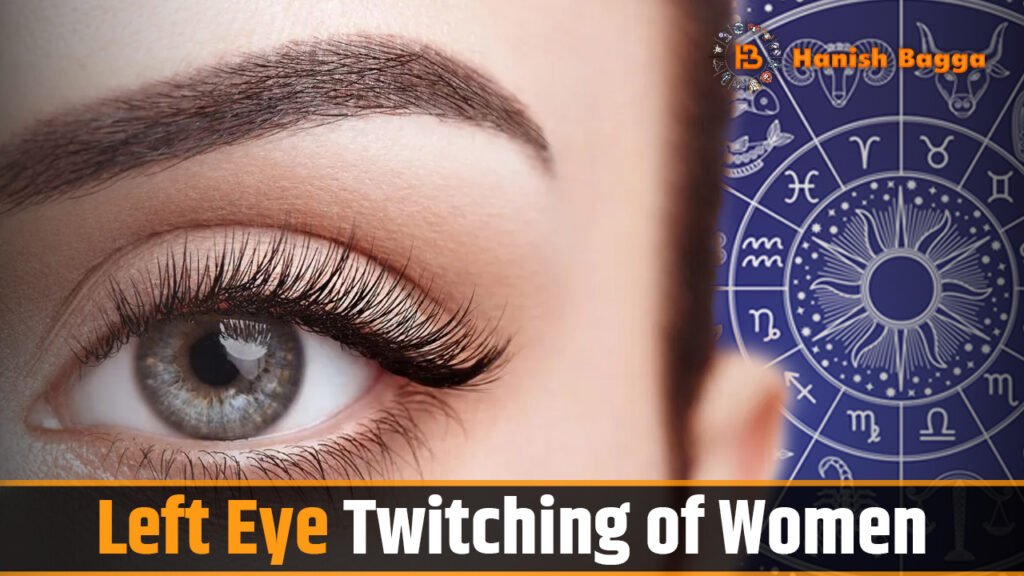Left Eye Twitching in Women
Left Eye Twitching in Women is a phenomenon that has intrigued people for centuries. For many women, a sudden spasm or fluttering in the left eyelid often sparks curiosity—could it be a sign of impending luck, or does it warn of misfortune? This question has roots in both cultural superstitions and medical science, making the topic both fascinating and relevant.
The experience of left eye twitching, medically known as myokymia, is usually harmless and temporary. Yet, across cultures, this simple muscle spasm is loaded with meaning. In India, for example, left eye twitching in women is widely considered a good omen, believed to herald positive changes, success, or good news in various aspects of life such as career, finances, or family harmony. Conversely, some Chinese beliefs hold the opposite: for women, left eye twitching is seen as a sign of bad luck or misfortune, while for men, it signals good fortune.
But what does modern medicine say about this common occurrence? Is there any truth to these age-old beliefs, or is left eye twitching simply a benign bodily reaction to everyday stressors? Let’s dive deeper into the science, superstitions, and significance of left eye twitching in women.
Cultural Beliefs: Left Eye Twitching and Its Symbolism
Across the globe, left eye twitching is steeped in folklore and superstition. The interpretation of this phenomenon often depends on gender, the specific part of the eye that twitches, and the cultural context.
Indian Beliefs:
In India, left eye twitching for women is generally considered auspicious. According to Vedic astrology, a twitching left eye is a sign that good fortune is on its way. It may indicate upcoming success, the arrival of good news, or a harmonious period in family life. Many believe that if a woman’s left eye twitches, she might soon receive long-awaited news or experience a positive shift in her personal or professional life.
Chinese Beliefs:
Chinese superstitions offer a different perspective. Here, the meaning of eye twitching is reversed based on gender. For women, left eye twitching is typically viewed as a bad omen, potentially signaling misfortune or unfavorable news. In contrast, right eye twitching is considered lucky for women. Some Chinese traditions even specify that a twitch in the lower left eyelid means someone is gossiping about you or that you may soon shed tears.
Other Cultural Perspectives:
- Hawaiian Beliefs: A twitch in the left eye may signal the arrival of a stranger or, if persistent, forewarn of family sorrow.
- African Beliefs: In some African cultures, lower eyelid twitching suggests you will meet someone unexpectedly or may soon cry.
These diverse beliefs highlight how a simple muscle spasm can take on profound meaning, shaped by centuries of tradition and local customs.
Read about: Whispered Wonders: 6 Zodiac Signs Known for Their Silence
Medical Perspective: Why Does Left Eye Twitching Happen?
While superstitions provide colorful explanations, medical science offers a more grounded perspective on left eye twitching. The phenomenon is typically caused by involuntary spasms of the eyelid muscles, known as myokymia. Most cases are benign and temporary, resolving on their own without intervention.
Common Causes of Left Eye Twitching:
- Fatigue and Lack of Sleep: Tired eyes are more prone to spasms. Sleep deprivation is a major trigger for eyelid twitching.
- Stress and Anxiety: Emotional stress can lead to muscle tension, including in the eyelids.
- Eye Strain: Prolonged screen time, reading, or wearing the wrong prescription glasses can overwork the eye muscles, resulting in twitching.
- Caffeine and Alcohol: Excessive intake of stimulants like caffeine or alcohol can provoke spasms.
- Dry Eyes: As people age or due to environmental factors, dry eyes become more common and can trigger twitching.
- Allergies: Allergic reactions can cause itching, swelling, and twitching in the eyelids.
- Nutritional Deficiencies: Lack of certain nutrients, especially magnesium, may contribute to muscle spasms.
Most eye twitches are harmless, but persistent or severe twitching could indicate underlying conditions such as benign essential blepharospasm (more common in women) or, rarely, neurological disorders. If twitching persists for more than a week, involves other facial muscles, or is accompanied by other symptoms (like drooping eyelids, redness, or discharge), medical advice should be sought.
Remedies and Prevention: Managing Left Eye Twitching
For most women, left eye twitching is a temporary annoyance rather than a serious health concern. However, if the twitching becomes frequent or bothersome, there are several ways to reduce or prevent it.
Lifestyle Modifications:
- Get Adequate Rest: Prioritize sleep to reduce fatigue-induced twitching.
- Manage Stress: Practice relaxation techniques such as meditation, deep breathing, or yoga to lower stress levels.
- Reduce Caffeine and Alcohol: Cut back on stimulants that may trigger muscle spasms.
- Limit Screen Time: Take regular breaks from digital devices to prevent eye strain.
- Stay Hydrated: Dehydration can contribute to muscle spasms, so drink plenty of water.
Eye Care Tips:
- Use Lubricating Eye Drops: If dry eyes are the culprit, over-the-counter artificial tears can help.
- Check Your Prescription: Ensure your glasses or contact lenses are up to date to avoid unnecessary eye strain.
- Avoid Rubbing Your Eyes: Rubbing can irritate the eyelid muscles and worsen twitching.
When to See a Doctor:
- Persistent twitching lasting more than a week
- Twitching that spreads to other parts of the face
- Complete eyelid closure during spasms
- Associated redness, swelling, or discharge
- Drooping eyelids or changes in vision
In rare cases, persistent or severe twitching may require medical treatment or referral to a neurologist for further evaluation.
Read about: Zodiac Signs That Are Unstoppable in Their Careers
Myths vs. Reality: Decoding the Superstitions
The enduring popularity of left eye twitching superstitions highlights the human desire to find meaning in everyday occurrences. But how much truth is there to these beliefs?
Scientific Viewpoint:
There is no scientific evidence linking left eye twitching to luck, fortune, or future events. Eye twitching is a physical response to factors like fatigue, stress, and eye strain, not a mystical omen. While cultural interpretations can be comforting or entertaining, they should not replace medical advice or self-care.
Cultural Significance:
Despite the lack of scientific backing, superstitions around left eye twitching persist because they offer a sense of predictability and control in an uncertain world. For many women, these beliefs are woven into the fabric of daily life, passed down through generations as part of cultural heritage.
Personal Reflection:
If you find meaning or comfort in these traditions, there’s no harm in acknowledging them—provided you also pay attention to your health. If left eye twitching is frequent or accompanied by other symptoms, it’s wise to consult a healthcare professional.
Conclusion of Left Eye Twitching in Women
Left eye twitching in women sits at the crossroads of tradition and science. While many cultures imbue this common occurrence with symbolic meaning—ranging from good fortune to cautionary warnings—modern medicine attributes it to everyday factors like fatigue, stress, and eye strain. Most cases are harmless and resolve on their own, but persistent or severe twitching deserves medical attention.
Whether you view left eye twitching as a mystical sign or a simple muscle spasm, understanding both the cultural context and medical facts can help you respond wisely. Embrace the traditions if they bring you comfort, but don’t ignore the practical steps to maintain your eye health and overall well-being.
For more informational astrology related videos, subscribe us on YouTube
FAQs about Left Eye Twitching in Women
Q1: Is left eye twitching in women a sign of good luck or bad luck?
Ans- In Indian culture, left eye twitching in women is considered a sign of good luck, while in Chinese tradition, it is often viewed as a bad omen for women. Medically, it is not associated with luck.
Q2: What causes left eye twitching?
Ans- Common causes include fatigue, stress, eye strain, caffeine, dry eyes, allergies, and nutritional deficiencies.
Q3: When should I see a doctor for left eye twitching?
Ans- Seek medical attention if the twitching lasts more than a week, affects other facial muscles, or is accompanied by redness, swelling, discharge, or vision changes.
Q4: Can left eye twitching be prevented?
Ans- Yes. Adequate rest, stress management, limiting caffeine, staying hydrated, and reducing screen time can help prevent twitching.
Q5: Are there any home remedies for left eye twitching?
Ans- Applying a warm compress, using lubricating eye drops, gentle eyelid massage, and taking breaks from screens may help alleviate symptoms.
Q6: Is left eye twitching ever a sign of a serious condition?
Ans- Rarely, persistent or severe twitching may signal neurological issues such as benign essential blepharospasm or hemifacial spasm, which require medical evaluation.


